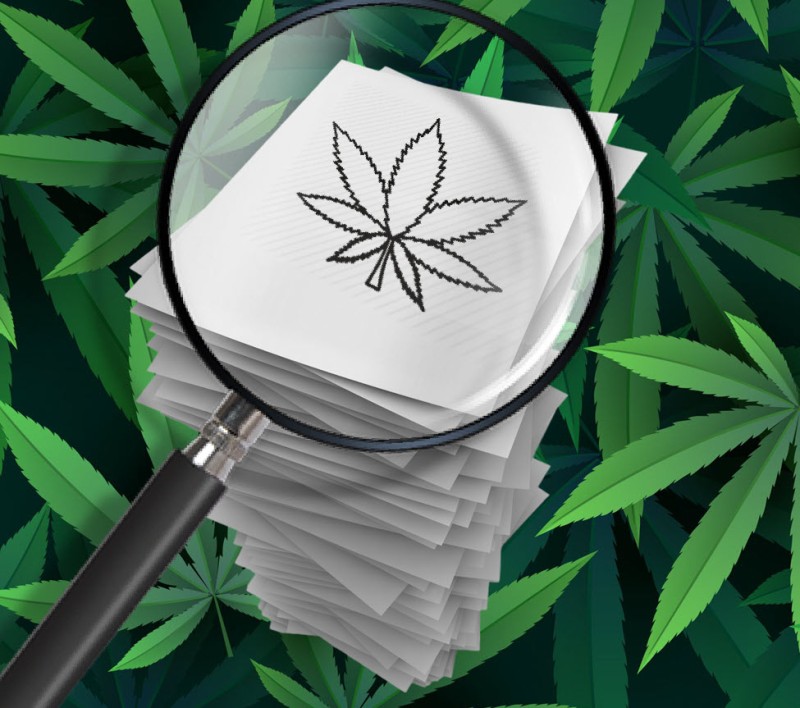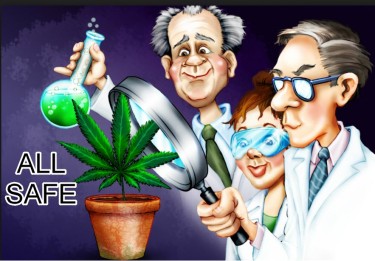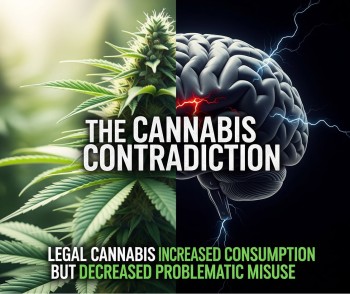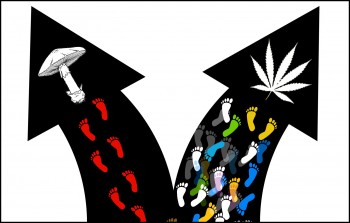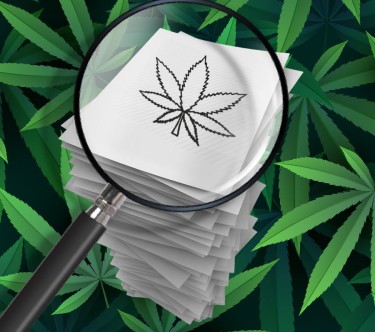
Dispelling the Myth of Not Enough Research
When opponents of cannabis law reform run out of reasoned arguments, they inevitably fall back on some version of the “we just don’t know enough yet” appeal. Despite thousands of accumulated years of human experience with cannabis, and an explosion of modern research, prohibitionists claim we must maintain strict controls until every last concern gets addressed. Yet this relies on a mythical standard of absolute knowledge that no policy ever actually meets.
In reality, the argument that cannabis lacks adequate scientific research acts as a thought-terminating cliche allowing people to retain irrational biases. It provides facile cover for those unwilling to examine evidence confronting their beliefs. When one cannot dispute existing data, one demands non-existent alternative data. But as with climate change or evolution, the strength of evidence reaches a point where claiming ignorance becomes absurd. Cannabis surpassed an overwhelming burden of proof long ago.
In fact, over the past decade researchers published over 32,000 cannabis studies, with intense interest and inquiries far outpacing schedules drugs. The mountain of accumulating data continues to fill remaining knowledge gaps at exponential rates, though ideology struggles to keep pace with implications. At this point the rate-limiting factor in comprehending cannabis is not the science but rather acknowledging its conclusions.
Put simply, there is more than enough cannabis research out there for even the most stubborn skeptic or ersatz concern troll. Vague dismissals that “we just don’t know” constitute willful ignorance, not responsible caution. Those making blank appeals against cannabis reform due to lack of research betray the fact that they simply haven’t bothered performing even cursory literature reviews. Their opinions reside firmly in scientific illiteracy and psychological denial.
Today we will explode once and for all the story that humanity lacks ample data to form sensible cannabis policies. In fact the bulk of evidence signals it is prohibition causing net harm, not cannabis itself. The myth contains no clothes.
Federal Hypocrisy explained
When examining the modern research record, the claim that cannabis possesses no medical utility becomes increasingly absurd and dishonest. The peer-reviewed literature now includes over 36,000 papers specifically referencing the plant and its components - with over 32,000 published in just the past decade alone as clinical interest intensifies. This proliferation of new data contradicts any suggestion that experts lack adequate scientific understanding of marijuana’s risks and therapeutic potentials.
In reality, some of the world’s top hospitals and research centers continue expanding investigations into cannabis-based treatments for conditions ranging from autism to cancer. The plant’s complex pharmacology reveals diverse medical applications, not simplistic legal categorizations based on an alleged lack of benefit coupled with exaggerated harms. No legitimate reading of marijuana science in the 21st century could reasonably uphold such distorted conclusions rooted in obsolete cultural biases rather than facts.
The range of conditions referenced in the table of contents of this article demolition the notion that cannabis possesses no medical utility. We see specific cannabinoid compounds demonstrating effects as medications for gastrointestinal, neurodegenerative, autoimmune, anxiety and chronic pain disorders among others. The versatility of cannabis to potentially treat such varied conditions simply does not occur with compounds lacking real therapeutic potential.
And while risks exist for a small subset of consumers, these concerns do not outweigh extensive documentation of benefits - otherwise legal pharmaceuticals like opioids and amphetamines could not maintain FDA approval. In contrast, no clinical literature verifies claims that, for adults, cannabis’ potential for harm outweighs its far greater probability to improve quality of life when judiciously applied.
Acknowledging these facts explains why human use persists throughout recorded history regardless of legal regimes. If prohibition’s medical premise was accurate, such relentless experimentation and innovation would collapse from lack of value. That decades of violence enforced via policing and prison did nothing to deter personal experience exposes the sheer futility of fabricating false narratives about cannabis’ relationship to human thriving.
In fact, the US government itself disproves its own medical misinformation by distributing medical cannabis to select patients for nearly 50 years through the Compassionate Investigational New Drug program, though obstruction limited participants to less than three dozen. Challenging this charade reveals not recalcitrance to truth but allegiance to reason the federal denial cannot hide from indefinitely.
The verdict is in; cannabis unambiguously possesses highly significant therapeutic properties for various conditions along with moderate risks researchers work diligently to characterize and mitigate. No defensible argument grounded in science rather than outdated pathology can pronounce otherwise.
Even if it’s dangerous
Even hypothetically classifying cannabis as categorically “dangerous” fails to ethically justify its prohibition. In a society premising respect for individuals on preserving their self-ownership, competent adults reserve rights to informed consent regarding activities with intrinsic hazards. Hence government lacks legitimate authority to arbitrarily censor choices concerning one’s own body, life benefits and risks resting solely with the individual. Legally and philosophically, paternalistic arguments to forcibly “protect people from themselves” prove both disastrous and self-contradictory.
Consider that dangerous yet legal drugs like alcohol kill tens of thousands annually through direct use while cannabis kills no one. Yet broadcast promotion glamorizes booze consumption to all ages despite predictable casualties and violence from excess. Conversely the state employs force to prevent cannabis ingestion though its acute toxicity is essentially nil. Any consistency in alleged “public safety” arguments collapses when directly comparing reactions to demonstrably more harmful yet condoned behaviors.
Blanket Drug War criminalization shreds the very notion of a free society by demolishing boundaries restraining government imposition on personal conduct. If agents can storm private property at gunpoint to halt commerce in universally safer psychoactive herbs, no genuine limits against state intrusion exist at all. And absent set limitations structurally restraining state power over personal choices, no meaningful rights remain to distinguish despotism from democracy – including in facets of life beyond drugs.
Hence the question becomes where to cease useful pretenses that overriding consent “protects” rather than destroys freedom itself. At what point do unexpected risks lose relevance alongside the right to direct one’s own life? And is it morally preferable to normalize overwhelming force removing self-direction rather than upholding agency to consider options beyond confirmation bias? The ramifications span far beyond cannabis alone.
Perhaps risks reach points drastic enough in rare outlier cases like imminent suicide ideation that intervention against one’s will acts as lesser evil, though defining such exceptions requires immense diligence. But cannabis remotely approximates no such pressing crisis; it facilitates life enhancement, creative pursuits, medical substitution, and spirituality for most citizens. And even misuse flowing from legal access poses orders of magnitude less damage than the status quo’s violence and life-derailment.
So whether one believes cannabis objectively harmless or laden with abuse potential, the bedrock ethical principle of self-ownership precludes its prohibition. Only by gaping logical inconsistencies can a society dismiss bodily autonomy selectively. And defending agency – the power to control one's body and claim the benefits and consequences of their actions – remains prerequisite for defending rights at all. Recreational foliage fails any rational threshold where forced “protection” from optional experimentation outweighs the cost to human dignity from intrusion. Thus ethics demands legality either way.
They aren’t representing you!
The theater of cannabis prohibition strains any pretense that modern policies intend to serve common welfare over insider interests. As public majorities continuously favor reform yet find their preferences ignored and overridden, the veil lifts on who truly dictates the status quo – and it assuredly does not include average citizens. When the many acquiesce to the few wielding power against them, dynamics of control rather than representation govern the state.
The relentless suppression of cannabis reveals profound distrust toward people governing their own lives, not danger legitimizing subjugation. This pathological need for command and obedience perverts democratic self-rule into tyranny of the majority codified via police and prisons. Rather than empower insight or responsibility, instituted powers demand compliance and sacrifice instead – they serve citizens no benefit beyond nominal “protection” from their own agency.
We witnessed similar dynamics when credentialed experts faced censorship for challenging pandemic narratives enabling enormous pharmaceutical profits. Their dissent threatened not public health but elite prerogatives couched as doing good. Prohibiting peaceful choices while encouraging genuine poisons exposes the ruse - no factual basis supports equating cannabis with deadly legal drugs, let alone banning the natural herb. Such contradictory stances serve financial interests above rights or safety. And violated rights signal inner machinery of democracy broken beyond repair.
When “public policy” directly contravenes public opinion yet remains entrenched by authorities never subjected to elections, the will of common people lacks any effective representation. Their place becomes pliant masses ruled by technocrats, political dynasties and corporate oligarchies. Issues like cannabis uncover how modern states suppress populaces within systems promising self-determination on paper.
Therefore ending prohibition occupies importance far exceeding the herb; it signifies reclaiming policymaking levers for citizens themselves against inertia of embedded powerful interests. Truly representative governance cannot blithely overrule supermajority public consensus on any issue indefinitely with impunity, lest it loses legitimacy as anything beyond glorified dictatorship wearing superficial regalia.
In that context, cannabis offers opportunity to prove principles of self-rule still animate democratic lifeblood. Or conversely, upholding its historically unprecedented and scientifically baseless banning in defiance of public opinion demonstrates a Potemkin village where ordinary voices assemble formally but wield no influence. Either civil majorities reclaim authority over their collective destiny, or the grand experiment in distributed authority fails entirely, ceding to structures of top-down population management mouthing vacuous nostrums about “freedom.”
The Sticky Bottom Line
Elucidating the futility of cannabis prohibition aims not to overwhelm but to empower. By exposing the façade, we shine light through cracks revealing paths forward. Truth sets possibility free, beginning within each individual.
The founding vision for this nation anchored in principles of open discourse, autonomy and self-governance. Though imperfectly practiced, these ideals birthed most prosperous societies in human history. They remain guidelines worth fighting for.
Yet the game stays rigged only when we accept rigged rules. We need not play games fixed against us, but gather collective courage to assert rules representing our shared interests. Mass refusal of unjust laws peacefully nullifies their power. And courage stands contagious - when communities defend reason over coercion, hope ignites.
The state cannot operate without public complicity. Its sole purpose ought to uphold freedoms enabling citizens to thrive through self-direction. Any structures systematically overriding agency toward those ends no longer serve common humanity, but metastasize as tyranny dressed in familiar branding.
Our role lies not in violent revolution, but non-violent evolution toward systems facilitating empowerment.
We abandon assumptions that central authorities best solve local problems. Instead we work locally to prove mass flourishing blossoms when all lead themselves. The game only felt rigged when we forgot our place as players, not pawns.
The board resets when we make different moves.
